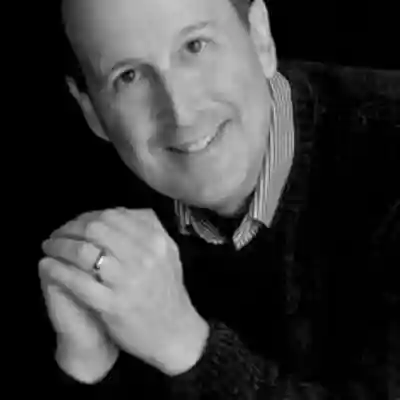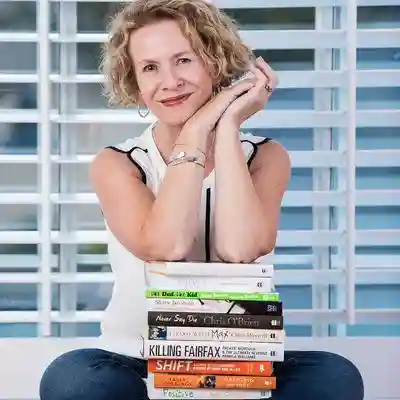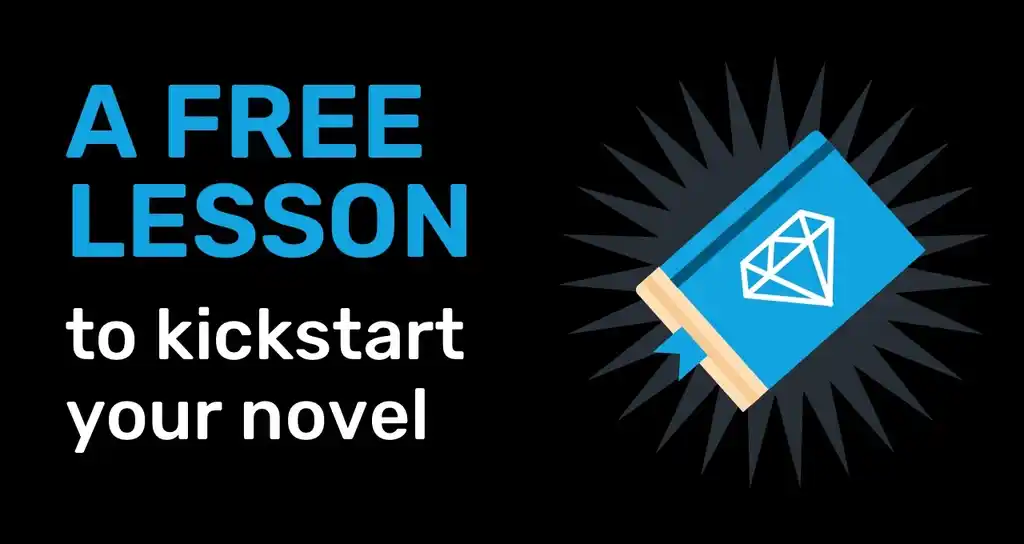Traditional vs Self-Publishing: An Author's Inside Scoop
15:00 EST - Sep 22, 2021
Thank you all for joining us, my name’s Paul Carr and I’m here to talk about my career as a traditionally published author. I wanted to do this because I know there’s a great spectrum in the conversation surrounding traditional vs self-publishing and I feel like there are lots of people who are very bullish on traditional publishing and maybe look down a little bit on self-publishing. And there are also people who are very, very bullish on self-publishing, saying “It's the future! Everyone who is traditionally publishing is stuck in the past.”
I have a very nuanced, I think, take on it. To give you some history I have been an author — traditionally published by several of the Big Five publishers for basically my entire career. I wrote my first book when I was 19 — now I'm 41 and I've published a dozen books all, until very recently, with traditional publishers. I also used to be a publisher. I ran a publishing company in London and also one in Las Vegas. So I've published other writers, I've published books traditionally and distributed them traditionally. My entire career, I was very much a traditional publishing purist. It wasn't that I wasn’t interested in self-publishing, I just didn't really know much about it and I think I probably had the same biases. I think a lot of people have that — it’s sometimes seen as a way that people who couldn't get traditionally published could get their book out there.
So, the purpose of what I want to talk about today is how that's changed and how my views on self publishing have changed to the point where, as I keep telling anyone who knows me well, I think we're living through a golden age of self-publishing. The only thing I can liken it to is when I first saw blogging emerge. When I first got into writing about technology, it wasn’t long before blogging started to emerge as a fringe activity where people who had been shut out of the mainstream conversations could write and share their work and their thoughts. And it followed the typical timeline of first they ignore you, then they mock you, then they fear you. And now we live in a time where people are quitting jobs at the New York Times to go write blogs and email newsletters for places like Substack. And I really think we are about to see a similar shift suddenly of self-publishing crashing into the mainstream. And I wouldn't be surprised if in a few years we see the same idea of lots and lots of traditionally published authors going independent and traditional publishers trying to affect the pose of indie publishing and launching authors as if they're indie published.
My journey
So, let's start talking about my journey. As I said, I published more than 12 books with traditional publishers and all of them were non-fiction. I wrote memoirs, I wrote books about the technology industry and the tech billionaires and then a few years ago I had an idea for a novel. I spent 20 years talking about technology and startups and things through the lens of nonfiction, but anyone who knows Silicon Valley will know it's kind of turned into this dystopian scary place. It felt like nonfiction wasn’t really cutting it anymore, so I wanted to write a novel — a murder mystery set in Silicon Valley.
Trying the traditional route
My first thought was to do exactly what I've always done: get a literary agent. And I started down that road. I reached out to some agents. I know that some of you are at this stage right now and know how difficult that is. I got a lot of people who wanted to see my full manuscript. And then I got to a point where I was facing 12 weeks plus of waiting to even hear back from people who were reading it. And I realized that what I’ve learnt in Silicon Valley is that you don’t really have to wait for somebody to tell you that your work has value, that your company idea is a good one. You can just start it and, of course you might need some investment capital, but even before that you can build what’s called a minimum viable product and see if people are interested in it. It just seemed really jarring to me that I had what I thought was a really good novel that was now completely at the mercy of these literary agents. And so my girlfriend, Sarah, who is also a writer, said “Well, why don't you publish it yourself?”.
Moving to self-publishing
Since I’ve been a writer for a long time, I have a platform and an audience who I know love my work and people who I know will read my books. So, why don’t I self-publish? Makes sense, right?
And I think I probably had the same reaction that a lot of authors do which is, “Yeah, I'm not that much of a failure, I'm going to keep trying with literary agents.” But the more I thought about it, like I said, the more I thought I should at least investigate this because the last time I’d looked at self publishing was 10 or 15 years ago. And it was in those days it meant you just photocopied your book and sold it out of your car boot, or trunks for Americans. But, I’d also heard a lot about authors like E.L. James and Andy Weir who had self-published and then gotten traditional deals off the back of it, or people like L.J, Ross who are making a lot of money entirely through self-publishing. So, I decided to check it out.
What I discovered was that in the last decade the self-publishing landscape has changed so much that it’s now unrecognizable. It is now a golden age of self-publishing and you shouldn't just be thinking about it because you don't think your book will sell in the mainstream. You should be seriously considering doing it anyway, for reasons I'll get into later.
What’s changed in the self-publishing industry?
First of all, to give you some context, my book is a murder mystery called 1414°. It's a murder mystery about Silicon valley, but it's also based on my 20 years covering the people there — some of whom are awful, awful human beings, who I thought would be great characters in a murder mystery.
Having done traditional publishing for a long time, I also knew that lawyers get very nervous in traditional publishing. Anyone who's published a book and included a quote from a song or something in there, you'll know the lawyers immediately start worrying about copyright issues. You can't do that. Or if you mention a real brand, even if you're saying the character just went into Starbucks, people get nervous and say, “Well, can we use that? Are we, are we making Starbucks look bad? We should take that out and say something more generic.” And for good reason — people get sued a lot.
So I knew this book was going to be a challenge to publish but here’s what I discovered had changed. First of all I should mention Reedsy because we're all here because of Reedsy.
Platforms like Reedsy have changed the game significantly because when I was a publisher, we had to find copy editors, editors, typesetters, designers, and cover designers, and really, the only way to find those was to already be in publishing and know where to find them. You can now hire the same people who would be working on your book at HarperCollins, Penguin Random House, on platforms like Reedsy. And I'm sorry for those of you who are already self-published, but it's important to those who want to understand how much this has changed. Things like IngramSpark, which traditionally has been a distributor of books into bookshops, are, again, a massive game changer. You also no longer need to sell physical copies of your books. Amazon is, of course, the elephant in the room. Love it or hate it, the Kindle has changed everything.
The biggest thing holding people back from self-publishing was the stigma. But now, if you can commit the time and resources to hire a professional publishing team, there’s no reason why you can’t produce a book that is just as good, if not better, than one that’s been traditionally published. There’s no reason why you can’t get distributed into the same bookshops, either. If you do the job right, people won’t know that you’ve self-published — nobody except for publishers and some authors care about the imprint on the spine of your book. They won't look at it. They will hear the buzz around the book. They will hear about it on social media. They will see it on Amazon. They don't care if it's traditionally published or self-published — they only care about whether the book is good. And if they buy a book and it's good, they'll tell the world. If they bought your book and it sucks, only then will they ask who published it.
Now, this is the only plug I'll get for anything other than my book in this webinar: I'm actually running an eight-week course on how to get your book published, both traditional and self-published.
Publishing my book
Now I want to get into the specifics of my book.
With fiction writing, I hate to tell you this, but it doesn’t matter if you’re traditionally published or self-published — you have to finish writing your book before you can start the publishing process. And I encourage you to take as much time with that as you need. I used to write non-fiction where you could sell the book on a proposal. Writing fiction is really frustrating because you have to finish the thing. It took me four and a half years to write my novel — there were times I wanted to give up, but I'm so glad I put the time in to get the novel as good as it can be.
I'm sure everyone watching (or reading) this is a fantastic author but if you ever feel stuck there are plenty of fantastic books about writing or story coaches out there who can help you. I worked with someone called Lisa Cron who wrote Wired for Story and I really recommend her book.
Editing
Next, if you want to get your manuscript on top form I cannot emphasize enough the importance of then hiring an editor. I found my editor on Reedsy, of course. He’s a developmental editor and does exactly the same job as an editor would at a publisher — they'll take your polished manuscript, and they'll tell you all of the ways in which you need to fix it, to make it publishable. You can be very forward and just tell them you want them to do the same job they would do for a publisher — they don’t need to spare you any criticism. I worked with my developmental editor for a couple of months, rewriting and reshaping my book and it massively improved it. You just have to leave your ego at the door.
The second person to hire is a copy editor. A good copy editor will save you from yourself so many times, not just in terms of typos, but in terms of making sure you haven’t got some ridiculous errors like I did. For example, I had somebody wearing a winter coat in June, or characters whose hair color changed throughout the book. None of this has to be expensive, by the way — you can charge a whole range of prices on these platforms and get people who are really affordable, and it will not be wasted money. Do not think you can get your friend or yourself to edit your book — you will be wasting money in the long term.
Designing the book
I then hired a cover designer to do a professional cover. You can do it yourself on Microsoft Paint, I guess, but you want a book which will look professionally published when people see it on the shelves or on Amazon. And equally, you want a good back blurb. Of course you could do that yourself because you’re a writer, but take a look at books in your genre and take note of what they’re back cover copy is like because that’s the second thing people will see on Amazon.
To make your book the best you can, hire a typesetter who will then typeset the book so that it looks like a traditionally published book. That same person for me also did my eBook version. I don't want to get too much into the tribalism between people who publish only through things like IngramSpark and people who publish on Kindle Direct Publishing — I did everything through IngramSpark because I didn’t want to get into the nuts and bolts of learning both, but a lot of people advocate for distributing eBooks through KDP and Amazon, and print through Ingram. That’s not what we’re talking about today, but do your research and work out what’s best for you.
Royalties and reviews
People will say ‘Well, that’s all well and good for you if you can afford to spend this time and money’ and I have a couple of answers for that.
The first is yes, I am very lucky. I had money from previous books that I could put into this, but also don't be fooled by how much has changed in traditional publishing and the idea of getting a big advance upfront. Unless you’re already a big name, you can forget about it in almost every case. Every author I know is also baffled by how much work they’re expected to do themselves — whether that be social media or organizing their own events and readings. I even know authors who have been advised by their publisher to hire a publicist!
So, if a lot of what traditionally was the job of a big publisher is now your job anyway, why not just do it yourself? If you’re doing so much of the work, then shouldn't you be getting all of the money?
I did some math and here's the truth of it. My last book sold more than 10,000 copies, which isn't the biggest success that any author could have but it means it’s done pretty well. I realized that if I sell half of that many copies with the new book then, first of all, I’ll cover all the costs of self publishing, and then every individual copy after that will make me more than twice as much as I would have got from a traditional publishing deal. I don't have to give 50% to an agent, I don’t have to give a cut to the publisher, I don’t have to pay anyone for warehousing books and the rest of it. That is all built into that deal, unlike the way I am doing it.
Now, the book’s not out yet, so the proof of the pudding will come after October 11th. But, I will tell you this, the reviews for the book are just as plentiful as they have been for my traditionally published books and I go more into this in my course. Reviews for self-published books are just as prominent and just as valuable as if you were a traditional author. We’re at a point where Amazon reviews trumps everything else and those are totally open to us as authors.
So I'm currently on track with my first self published book to achieve more success than I did with traditional publishing. So this isn't a pipe dream. I'm going to make more money and have more success from my traditionally published book and from my self-published book than I did from my traditionally published book.
The downsides
Now I want to talk a bit about the downsides because I'm painting a very rosy picture here, but I do want to take some time to, to talk about the downsides because that's the reality of the experience. They may not trump the decision to self-publish, but the disadvantages do still need to be considered.
Stigma
There is still some stigma if you don’t take the traditional publishing route. It may not be applicable to most readers, but it is to the press and the wider world. You will not get reviewed in the New York Times — no matter how good your book is, if it's self-published, you just won’t. And by New York Times I mean pretty much any newspaper in America. You will struggle similarly to get reviewed on most of the prominent literary websites and those that do review you will feel the need to point out that this is a self published book.
Bookshops and bestseller lists
This is the number one problem for me. Most traditional bookshops will not stock self published books. They’ll be able to order it in through things like IngramSpark for customers who specifically request it, but it won’t be on the shelves when people walk in. And that is, for me, the biggest blow of self-publishing because all of my previous books have been on those bookshelves. There’s no denying how great it feels to walk into a bookstore and see your book on the shelves.
Frankly the fault is not with self-publishing, it’s with bookshops. It's ridiculous that so many self-published books are better than the worst of the traditionally published books, and sometimes better than the rest of them, and yet bookshops will just immediately group them all together.
Similarly, if bestseller lists reflected what people are actually buying then they’d be pretty different. The New York Times bestseller list would be full of some crazy books, but also a lot of self-published and non-traditionally published books. But the NYT doesn’t consider them legitimate books and it’s the same with a lot of others like the Wall Street Journal and USA Today. Because of that stigma, you won't see yourself on a bestseller list, even if you deserve to be oftentimes. And that's just ridiculous.
I mentioned at the beginning of this session that the stigma is going away for readers and just like blogging used to be dismissed, it’s now being taken a lot more seriously. I do think in 10 years from now, it's going to be insane that there was ever a time when self-published authors weren't taken seriously, but you should know that that is a current downside.
Costs
And then of course the biggest downside is you will have to pay money up front that you may not have. We don't need to go too deeply into the privilege that comes with being able to self publish, but it's real and to do it well you probably have to have some money in the bank now.
I would love to see more people investing in books just as ideas, like tech companies in Silicon Valley. Letting people self-publish but helping people out in advance with the equivalent of a venture capital investment. Self-publishing shouldn’t only be available for people who have money in the bank. That said, the idea that traditional publishing is a meritocracy is also ridiculous — so many people who traditionally publish already have money or platforms. The whole game is rigged anyway so you might as well be the one making money off it.
Upsides
Those are the big downsides. I should go back to a few more upsides as I've already talked about the fact that if you do well, you will make more money from self-publishing than you will traditionally and the independence thing is really real. A lot of very good books don’t get published because agents and publishers know what will and won’t sell. They will look at a lot of self-publishing books and if the audience isn’t clear they won’t want to take on the risk.
I have a platform, I have an audience and I still had a lot of agents who were unsure of how they would sell my book because they didn’t know who the audience was. My response was that I know the audience and already have them as a platform and a mailing list. With self-publishing, you have to prove that you have an audience and prove that people want it. Then, if you do well, you’ll have your pick of pathways and can choose to go traditional or stick with the self-publishing route.
But also maybe your book isn't supposed to sell millions of copies. We talk about best-sellers as if they’re the be all and end all, but there are lots of amazing books that don’t make best-seller lists. I wrote a book about my challenges in getting sober. I've been sober now as an alcoholic for around 12 years and I wrote a book about getting to this point. I didn’t write it with hopes of selling many copies — it was published with a very small publisher with a tiny advance that was barely worth much if I’m honest. But, I wanted to write a book for people who, like me, were struggling to get sober. I wrote it because it was important to me.
There are so many important topics like going through bereavement, dealing with illness, raising children, LGBTQ identities, and so many more that are so important, but don’t necessarily have a big enough audience for traditional publishers. Self-publishing now means that not only can you get that message out there, but you can get it in a way that reaches just as many people in the form of a book that looks just as good on bookshelves. It is so significant how many voices can be heard that couldn’t before. I get almost emotional thinking about how self-publishing has changed that and Amazon, for all of its faults, has really helped push that forward and make it possible for somebody to publish a book and reach millions of people through Kindle.
So that's my broad take on the topic. I've had to pack a lot into 35 minutes and I'm very cognizant that I just ran through a bunch of stuff. I gave you a little bit of how to do it, a little bit of why you should do it, a little bit about the downsides but I hope it was a good comprehensive overview.





